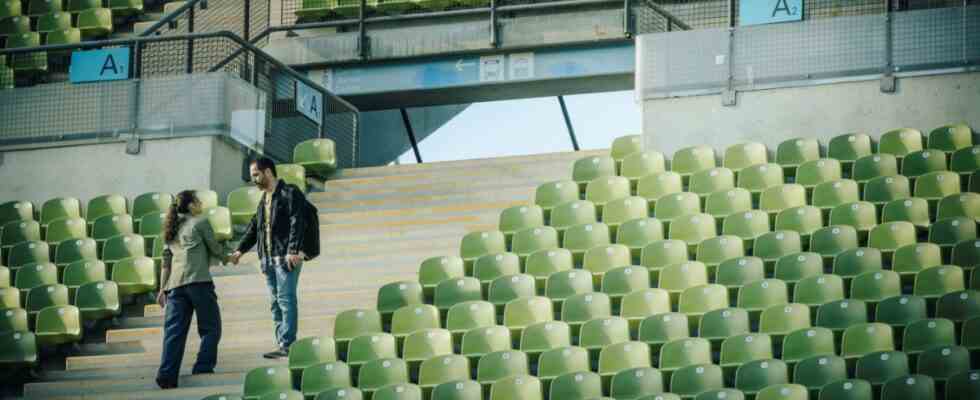Amazing what could have gone wrong with this project. And not just a little crooked, but really in the pants. A thriller series that draws its tension from the speculative continuation of a real massacre, you have to swallow first. Eleven Israeli athletes were murdered in cold blood by Palestinian terrorists in Munich on September 5 and 6, 1972, and a German policeman was also killed. Whether something like this would be possible again today is the basic question that “Munich Games” is negotiating.
The consideration is by no means harmless because one of the two murderers who is still alive just proudly announced in an ARD documentary that he would do it again immediately “should it happen”. The psychological wounds of the Olympic assassination are still far from healed, even after half a century, and the German security failure has still not been dealt with consistently. Only at the last moment did the Israeli survivors and the German government agree on compensation, which was the only way to commemorate the 50th anniversary together.
The shadows of the past are currently even visible in the current news, in numerous documentaries anyway. You don’t need a fictional six-parter on Sky for that. And yet “Munich Games” is an outstanding contribution to this summer of remembrance, as original as it is clever and provocative in a downright pertinent way.
The viewers are granted few certainties in this series, initially only that a bomb is ticking somewhere deep in the catacombs of the Olympic Stadium. But who put them there and why is hidden deep in the threatening rain darkness that covers the scenes in many moments – a painful corrective for all Munich residents, who are just now prance through their city inspired by the dazzling pictures of the European Championships .
What is a foreign secret service allowed to do on German soil?
The plot revolves around a football game between the solidly fictional FC Munich 08 and Halutzi Tel Aviv, fifty years after the attack, the game is intended to be a celebration of German-Israeli friendship. The cheerful game is shaken by references to a planned act of terrorism, especially since German and Israeli investigators are actually busy with their colorful sensitivities. This time we have to work together, says a Mossad man (Igal Naor) pleadingly to his colleague from the Federal Criminal Police Office (Sebastian Rudolph, almost every sentence an event) on an abandoned parking deck. He replies, “Don’t we always do that?”
What a foreign, not at all squeamish secret service could and should do on German soil: This is a problem for which there is no more satisfactory solution in 2022 than there was in 1972. At that time, Israel offered to deploy a special unit; the Federal Republic refused with reference to the Basic Law. The German-Israeli author duo Michael Aviram (“Fauda”) and Martin Behnke (“Berlin Alexanderplatz”) draws a few such lines from yesterday to today, with delicate strokes of the pen, never so thick that the analogies become too obtrusive.
What else falls under terror prevention, what is paranoia anyway? In any case, the guys from the stadium security don’t look any less suspicious than the men from the refugee home. And that the sympathetic, rascally Halutzi patron (Dov Glickman) has something to hide, that’s something an Upper Bavarian country policeman notices. Why not just cancel the game? The game must go on: The present sometimes gasps for air in the stranglehold of history.
The investigative duo: a German policewoman of Lebanese origin and an Israeli agent
Nervousness just before panicking, that’s the basic pulse in the days before kick-off. As an investigative duo, the screenplay pulls together – against their will, of course – a privately and professionally energetic German policewoman of Lebanese origin (Seyneb Saleh) and a constantly irritated Israeli agent (Yousef Sweid), who prefers to perform any heroic deeds on the computer. Of course, an Israeli nerd can still easily compete with any German hipster.
The fact that the policewoman is having an affair with her most important informant in the Islamist milieu strains the good faith of the audience at first, but then soon joins a cast of characters that quite consistently refuses to conform to the usual logic and expectations. In this moral wasteland, no one is whole anymore, everyone broken in their own way. Director Philipp Kadelbach (“Our Mothers, Our Fathers”) stages this with feverish suspense and raw directness, supported by the good decision to simply let his characters speak Hebrew and Arabic, English and German.
Although the real horror of 1972 in “Munich Games” can only be seen in the opening credits and from a maximum distance in black and white, it is there every minute, as a reminder and as a warning, which then paralyzes the protagonists almost more than it moves. And all of this reflects a world that has become a bit more complicated since the Munich games.
Munich Games, six episodes, weekly on Sundays at 8:15 p.m. on Sky One and online in the stream.
You can find more series recommendations here.

